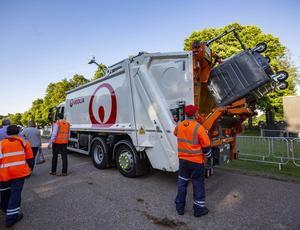DEFRA publishes Waste Prevention Programme for England. In addition, Ofwat accelerates action on water efficiency with a new £100 million fund.
DEFRA publishes Waste Prevention Programme for England
The Department for Environment, Food & Rural Affairs (DEFRA) has published its Waste Prevention Programme for England. The programme aims to move to a circular economy by keeping goods in circulation for as long as possible and at their highest value. This includes increasing the reuse, repair and remanufacture of goods. Their policy approach encompasses three cross-cutting themes:
- Designing out waste: Ecodesign and consumer information requirements, and Extended Producer Responsibility schemes.
- Systems and services: Collection and take-back services, encouraging reuse, repair, leasing businesses and facilities.
- Data and information: Materials databases, product passports and voluntary corporate reporting.
Based on available data on the number of waste arisings or known carbon emissions from production, they have selected seven key sectors for action:
- Construction
- Textiles
- Furniture
- Electronics
- Vehicles
- Plastic and Packaging
- Food
UKRI announces food packaging among targets of sustainable plastics research
Innovate UK has announced five new projects that will help to deliver a step change in the sustainability of plastics. £6 million in funding will underpin this work to cut the huge environmental damage that plastics cause, increase their longevity in use and boost their value. Led by UK universities, these multidisciplinary three-year projects will target:
- Easier recycling of multilayer food packaging, plastics incorporated in textiles, and plastics used in pregnancy and other medical tests.
- Greener production, use and disposal of hygiene products such as disposable nappies and incontinence pads.
- The breaking down of used plastics into their chemical components for reuse in producing high-quality new plastics.
The funding is delivered by UK Research and Innovation’s Engineering and Physical Sciences Research Council (EPSRC) (£5 million in funding) and Biotechnology and Biological Sciences Research Council (BBSRC) (£1 million in funding). The projects will support a more sustainable plastics system and help the UK move towards a circular plastics economy.
DESNZ updates Energy Bills Discount Scheme
The Department for Energy Security and Net Zero (DESNZ) has updated the Energy Bills Discount Scheme (EBDS) guidance for non-domestic customers. Eligible non-domestic customers will receive a per-unit discount on their energy bills during the 12 months from April 2023 to March 2024. This is subject to a maximum discount. The relative discount will be applied if wholesale prices exceed a certain price threshold.
For most non-domestic energy users in Great Britain and Northern Ireland, these threshold prices and maximum discounts have been set at:
- Electricity - £19.61 per megawatt-hour (MWh) with a price threshold of £302 per MWh.
- Gas - £6.97 per megawatt-hour (MWh), a price threshold of £107 per MWh.
The discount is calculated as the difference between the wholesale price associated with an energy contract and the price threshold. The discount is phased in when the contract’s wholesale price exceeds the floor price until the total discount per MWh reaches the maximum discount for that fuel.
Ofwat accelerates action on water efficiency with new £100 million fund
Ofwat has announced a new £100 million fund, which is being set up to stimulate a measurable reduction in water demand across England and Wales, for residential and business customers. The fund will sit alongside sector efforts to halve leakage by 2050 and develop £18bn of water supply infrastructure projects that are currently in progress. Alongside this announcement, Ofwat is also seeking views on water companies’ role in helping customers to conserve water and invites views on how Ofwat should be shaping this fund to benefit customers, communities and the environment for future generations.
The consultation seeks views on the following:
- What the fund should focus on, including areas such as dedicated work on behaviour change, use of data-driven insights and the introduction of technologies that promote water efficiency and reduce wastage.
- How we can most effectively bring in expertise from other disciplines and sectors while utilising best practices within the water sector.
- How best to implement the fund, including what governance may be required and how we can continue to protect customer interests.
-Further Reading-
DEFRA: Introduces second round of grants to tackle fly tipping
The Department for Environment, Food & Rural Affairs (DEFRA) have announced another round of funding grants to help local authorities in England deliver projects to crack down on fly-tipping.
That’s a Wrap: One year of the Plastic Packaging Tax
Now a year on since the tax was introduced in the UK, what has it achieved?
Energy Efficiency Tips For Your Business
Energy is a precious resource so we are encouraging our business customers to consider these simple tips to help reduce energy use.
DESNZ: New power-line
The world’s largest multi-use electricity power line will boost UK energy supplies with enough to power 1.8 million homes, and boost energy security.







